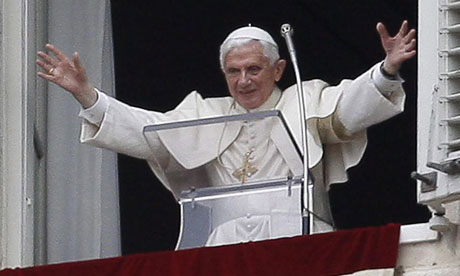The Pope's handout to disaffected Anglicans offers a glimpse into his mind
His $250,000 donation to the Anglican Ordinariate offers an insight into Benedict's vision of the church and his view of Britain
By Catherine Pepinster
THE GUARDIAN
http://www.guardian.co.uk/commentisfree/belief/2012/may/06/pope-anglican-ordinariate?newsfeed=true
May 6, 2012
 Anybody attempting to fund-raise in these hard-pressed times of austerity knows how hard it is to get big donations, especially now that George Osborne is going to tax philanthropy. So imagine opening an envelope to discover that, out of the blue, someone is giving your cause a quarter of a million smackers.
Anybody attempting to fund-raise in these hard-pressed times of austerity knows how hard it is to get big donations, especially now that George Osborne is going to tax philanthropy. So imagine opening an envelope to discover that, out of the blue, someone is giving your cause a quarter of a million smackers.
That is the happy state in which the Anglican Ordinariate - the body set up to provide disenchanted members of the Church of England a berth in the Catholic church - finds itself this week. A whopping US $250,000 (£154,000) is coming its way towards setting up the organisation. And it's from the pope himself, no less.
It's not an everyday occurrence that the pope provides handouts to cash-strapped good causes. I don't get calls from worthy Catholic organisations such as Cafod or the homeless charity The Passage telling me that the holy father has bailed them out. Maybe they're too discreet to say so. But it's not unheard of: Pope Benedict did send a donation to the appeal run by Fisher House, the Catholic chaplaincy at Cambridge University, for its refurbishment project.
But Fisher House got £2,000, paid in euros. This gift as well as being vastly more, comes in US dollars, the currency of Benedict's major publishers. Might it come from his publishing royalties?
I'd suggest this is about more than money. It gives an intriguing insight into church politics, Benedict's vision of the church, his personal thinking, and the way he perceives Britain.
News of the donation came hard on the heels of a talk given by the papal nuncio to Britain to the bishops of England and Wales. You might expect a talk on the issues facing the church here would have focused on attendance of mass, priest shortages, and the response of English Catholics to the new version of the English mass, imposed by Rome and not exactly going down a storm in the parishes. Instead, top of the nuncio's agenda was the ordinariate.
Now if the man who is the pope's number one diplomat in the UK makes what is officially known as the Personal Ordinariate of Our Lady of Walsingham, top of his agenda, you can take it as read that the message has come from on high and that it is seen as being of the utmost importance. And what Archbishop Antonio Menini said to the English and Welsh bishops was: "Do please continue to be generous in support of their endeavours." That's code for: "Knuckle under and make this work." And it wasn't the first time that the bishops got this message: Benedict urged them to be similarly enthused about the ordinariate during his final message to them at the end of his 2010 UK papal visit.
It's fair to say that the ordinariate hasn't been a runaway success in Britain. It has about 1,200 members who retain elements of their Anglican identity, including 60 priests. But there haven't been droves of them - although that may change when the Church of England welcomes women bishops.
The bishops of England and Wales might have welcomed the ordinariate but they don't seem to have exactly embraced it with a passion. At first they seemed to think it was something that would take off in the US and Australia, where there are larger groups who had already separated from the rest of the Anglican communion. The bishops' focus was more on ecumenical relations with the Church of England. So they offered the ordinariate a pretty ghastly unwanted church as its home and not much else.
But this imprimatur from the pope is surely a message to the bishops that they really do need to be backing the ordinariate to the hilt. That's a message that Archbishop Vincent Nichols will no doubt be musing on, as the clock is ticking on Cardinal Cormac Murphy-O'Connor's membership of the College of Cardinals, the group who choose the pope. Nichols won't be relying on the notion that he will automatically get the next red hat after Cormac, even if it would be deeply shocking if he didn't. He will know that Rome will have been watching how he is shaping up at Westminster. So being seen to be supporting the pope's own project in England is crucial.
The ordinariate has turned out to be divisive, yet backed to the hilt by the pope. What is it about it that he likes so much? If you want to understand Joseph Ratzinger, you need to go back to his Bavarian roots. He is steeped in a German Catholic culture and its literature, full of longings for beauty. He particularly treasures the works of Herman Hesse, who explores the tensions between loyalty to an institution and doctrinal system and one's own self-realisation. With the ordinariate, Ratzinger is offering people an opportunity to remain loyal to what they would see matters most - the tenets of an Anglican church that retains a certain Catholic sensibility.
And if Benedict allows them to keep what has been described as their Anglican patrimony, then they can keep the traditions that reflect Anglicanism at its aesthetic best - its stunning music, its beautiful prayers. This is a profoundly musical pope, after all, who was enraptured by Anglican liturgy when he visited Westminster Abbey during his papal visit to Britain, and has since then developed a taste for CDs of its choral music.













